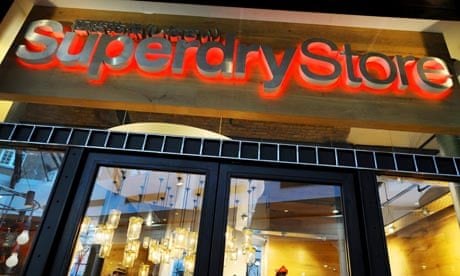The company behind the Superdry brand said the coming fortnight would be "key" to its fortunes, as new high street visitor data suggested that all retailers' Christmas sales were balanced on a "knife edge".
SuperGroup chief executive Julian Dunkerton said rivals were "making a big mistake" by cutting prices to attract shoppers. "There is a lot of discounting going on and we don't do that. If you have got it right, sales are OK-to-good – but I don't think it is brilliant for anybody."
His comments came as new figures from the British Retail Consortium (BRC) showed that there were fewer shoppers out last week than a year ago. The BRC-Springboard monitor said visitor numbers were down more than 2% on the same week in 2010, with high streets suffering more than shopping centres and out-of-town retail parks. Surprisingly, the survey also counted fewer visitors than in the last week of November.
"Footfall should be on a rising trend as Christmas gets closer," said BRC director general Stephen Robertson. "This drop shows festive sales are still on a knife edge. The fact Christmas Day falls on a Sunday will mean some shoppers leaving purchases until the final Saturday – but with only one full week of trading to go before the holidays, the final result is very much hanging in the balance."
The public sector strikes contributed to an "exceptional" level of footfall in the last week of November, he said.
SuperGroup was one of the most successful stock market flotations of 2010 and after listing at 500p, its shares rocketed to a high of £18.99 following a procession of stellar sales figures.
A poorly received trading update in May and a profit warning in October, caused by a computer glitch at its warehouse, saw a dramatic reappraisal, and speculation that young shoppers were going off a brand best-known for its logoed T-shirts, hoodies and jogging bottoms.
On Wednesday, the shares closed up more than 7% at 538.5p after SuperGroup said like-for-like sales had turned positive in the last six weeks and that its warehouse issues had been resolved. The misfiring IT system, which had resulted in lost sales as products were dispatched in small and extra large but not the sizes in between, contributed to a 4% decline in first half profits to £13m. It will reduce full-year profits by £8.8m.
Dunkerton batted away suggestions that young shoppers were tiring of Superdry. "I see the opportunity as being greater than it has ever been," he said. "People say our graphics are too bold, too this, too whatever, but T-shirts was one of the largest growth areas we had during November."
SuperGroup is expanding its clothing range on all fronts including knitwear, accessories and tailoring and has hired a large team of designers - including a fabric technician dedicated to developing new "checks" for its trademark brightly coloured shirts. It is also set to open a flagship store on London's Regent Street.
Oriel analyst Jonathan Pritchard said Superdry's management were trying to "freshen up" its appeal to 16-to-20-year-olds, which implied it had "probably waned", but added: "The range is starting to evolve. That's reassuring, as we have long felt that the heavily logo-ed garments were losing their novelty."
